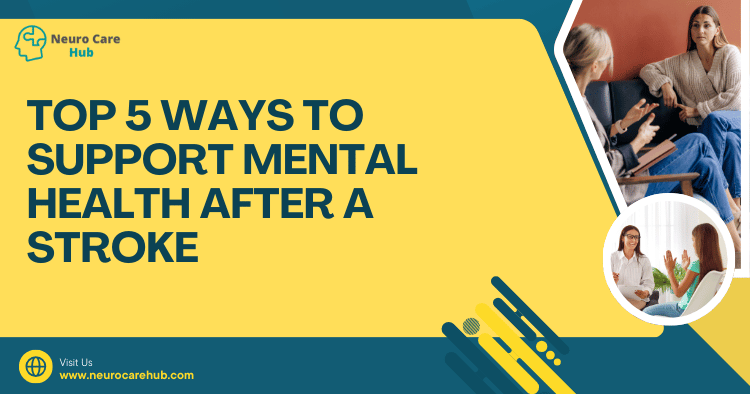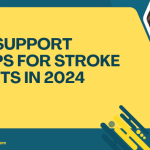Table of Contents
- 1. Practice Mindfulness
- 2. Engage in Physical Activity
- 3. Seek Social Support
- 4. Keep a Journal
- 5. Consider Professional Help
1. Practice Mindfulness
Mindfulness can help you stay present and reduce anxiety. Techniques such as meditation and deep breathing exercises can be beneficial.
2. Engage in Physical Activity
Regular physical activity can improve mood and reduce stress levels. Aim for at least 30 minutes of moderate exercise most days of the week.
3. Seek Social Support
Connecting with friends, family, or support groups can provide emotional comfort and encouragement during recovery.
4. Keep a Journal
Writing down thoughts and feelings can help process emotions and provide an outlet for self-expression.
5. Consider Professional Help
Talking to a mental health professional can provide expert guidance and support tailored to individual needs.
Table of Contents
- Understanding the Impact of Stroke on Mental Health
- Seek Professional Help
- Engage in Physical Activity
- Establish a Support Network
- Practice Mindfulness and Relaxation Techniques
Understanding the Impact of Stroke on Mental Health
When someone experiences a stroke, it can be a life-altering event, not just physically but emotionally and mentally as well. After a stroke, many individuals face challenges such as depression, anxiety, and even cognitive impairments. According to the American Stroke Association, nearly one-third of stroke survivors develop depression, affecting their recovery and quality of life.
Understanding these emotional and mental health challenges is the first step in addressing them. It is crucial to recognize that these feelings are common and valid.
Survivors might feel a range of emotions, from frustration and sadness to fear about their future. Educating oneself about these emotional responses can foster empathy among caregivers and family members, strengthening the support system. For more insights, check out Top 5 Reasons Neuro Care is Essential in Modern Medicine.
Seek Professional Help
One of the most effective ways to support mental health after a stroke is to seek professional help. Mental health professionals, such as psychologists and psychiatrists, can provide valuable tools and therapies tailored to the needs of stroke survivors. Here are some common therapies that can be beneficial:
| Therapy Type | Description |
|---|---|
| Cognitive Behavioral Therapy (CBT) | Helps patients understand and change negative thought patterns. |
| Psychotherapy | Provides a safe space to express emotions and cope with feelings. |
| Support Groups | Connects individuals with others who share similar experiences. |
If you’re unsure where to start, consider checking with organizations like the National Stroke Association or the American Psychological Association for referrals and resources.
Additionally, resources from Top 5 Benefits of Early Intervention in Neuro Care can be valuable.
Engage in Physical Activity
Physical activity is not only essential for regaining mobility after a stroke; it also plays a significant role in mental health. Exercise releases endorphins, which are natural mood lifters. Additionally, engaging in physical activity can boost self-esteem and reduce anxiety. Here are some ways to incorporate exercise into daily life:
- Start Slow: Begin with simple activities like walking or gentle stretching. As strength improves, gradually increase the intensity.
- Join Classes: Many community centers offer specialized classes for stroke survivors. These classes can provide both physical benefits and social interaction.
- Set Realistic Goals: Setting achievable goals can help maintain motivation and provide a sense of accomplishment.
For further information on promoting brain health through physical activity, see Top 5 Lifestyle Changes for Better Neuro Health.
Establish a Support Network
Having a strong support network is crucial for mental health after a stroke. Friends, family, and support groups can provide emotional backing and encouragement. Here are some ways to build a support network:
- Communicate Openly: Encourage open conversations about feelings and experiences. This can foster understanding and connection.
- Engage in Group Activities: Participating in group activities, whether in-person or online, can help stroke survivors feel less isolated.
- Consider Professional Support: In addition to family and friends, joining a support group specifically for stroke survivors can offer valuable insights and shared experiences.
For more on how family support enhances recovery, refer to Top 5 Ways Family Support Enhances Neuro Recovery.
Practice Mindfulness and Relaxation Techniques
Mindfulness and relaxation techniques can significantly reduce stress and improve mental health after a stroke. These practices encourage individuals to focus on the present moment, which can help alleviate anxiety about the future. Here are some techniques to try:
- Meditation: Spending just a few minutes a day in meditation can promote relaxation and clarity. There are many guided meditation apps available to help beginners.
- Yoga: Yoga combines physical movement with mindfulness, making it an excellent practice for both physical and mental well-being. Many classes cater specifically to stroke survivors.
- Breathwork: Simple breathing exercises can help calm the mind and reduce stress. Try inhaling deeply for four counts, holding for four counts, and exhaling for four counts.
Incorporating these techniques into your daily routine can create a more balanced approach to recovery.
FAQs
Q: What are the signs of depression after a stroke?
A: Common signs include persistent sadness, loss of interest in activities, changes in appetite or sleep patterns, and difficulty concentrating. If you notice these symptoms, it’s important to seek professional help.
Q: How long does it take to recover mentally after a stroke?
A: Recovery varies for each individual. Some may begin to feel better within a few weeks, while others might take months or longer. Continuous support and professional help can facilitate recovery.
Q: Are there medications available for mental health issues after a stroke?
A: Yes, medications such as antidepressants may be prescribed by healthcare providers. It’s important to discuss any concerns with a healthcare professional.
Conclusion
Supporting mental health after a stroke is a vital aspect of recovery. By understanding the emotional impact, seeking professional help, engaging in physical activity, establishing a support network, and practicing mindfulness, stroke survivors can navigate their healing journey more effectively.
Remember, recovery is a process, and it’s okay to ask for help.
For further resources, consider visiting the American Stroke Association or the National Institute of Mental Health. Together, we can create a supportive environment for stroke survivors to thrive.
This guide aims to offer practical advice and encouragement, making it easier for stroke survivors and their loved ones to prioritize mental health during recovery.
Sure! Please provide the Markdown content that you would like to convert to HTML.





